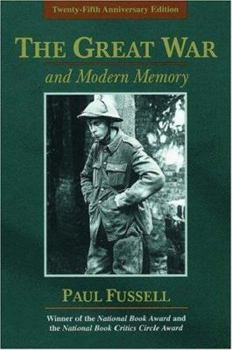The Great War and Modern Memory
Select Format
Select Condition 
Book Overview
The year 2000 marks the twenty-fifth anniversary of the publication of The Great War and Modern Memory, winner of the National Book Award, the National Book Critics Circle Award, and recently named by the Modern Library one of the twentieth century's 100 Best Non-Fiction Books. Fussell's landmark study of WWI remains as original and gripping today as ever before: a literate, literary, and illuminating account of the Great War, the one that changed a generation, ushered in the modern era, and revolutionized how we see the world. Exploring the work of Siegfried Sassoon, Robert Graves, Edmund Blunden, David Jones, Isaac Rosenberg, and Wilfred Owen, Fussell supplies contexts, both actual and literary, for those writers who most effectively memorialized WWI as an historical experience with conspicuous imaginative and artistic meaning. For this special edition, the author has prepared a new afterword and a suggested further reading list. As this classic work draws upon several disciplines--among them literary studies, military history, cultural criticism, and historical inquiry--it will continue to appeal to students, scholars, and general readers of various backgrounds.
Format:Paperback
Language:English
ISBN:0195133323
ISBN13:9780195133325
Release Date:March 2000
Publisher:Oxford University Press, USA
Length:384 Pages
Weight:0.78 lbs.
Dimensions:0.7" x 7.9" x 5.0"
Customer Reviews
1 rating
an indispensable reference for those interested in modernism
Published by Thriftbooks.com User , 25 years ago
Paul Fussell has created a significant study on the effects of World War I on the human consciousness and attitudes. This book is an especially useful tool for students of modern literature, as Fussell cites many instances in which the impact of the war was and, in some cases still is, reflected in the literature. Fussell's arguments include one explaining the modern distrust of language, especially abstract nouns. Central to this argument is Hemingway's famous quotation from A FAREWELL TO ARMS in which he states, "abstract words such as glory, honor, courage, or hallow were obscene beside the concrete names of villages, the numbers of roads, the names of rivers, the numbers of regiments, and the dates." Fussell explores the War's myriad of adverse effects and skillfully reports his conclusions on their effects on the modern state of being in this study which is an indispensable tool for those interested in modern studies.






